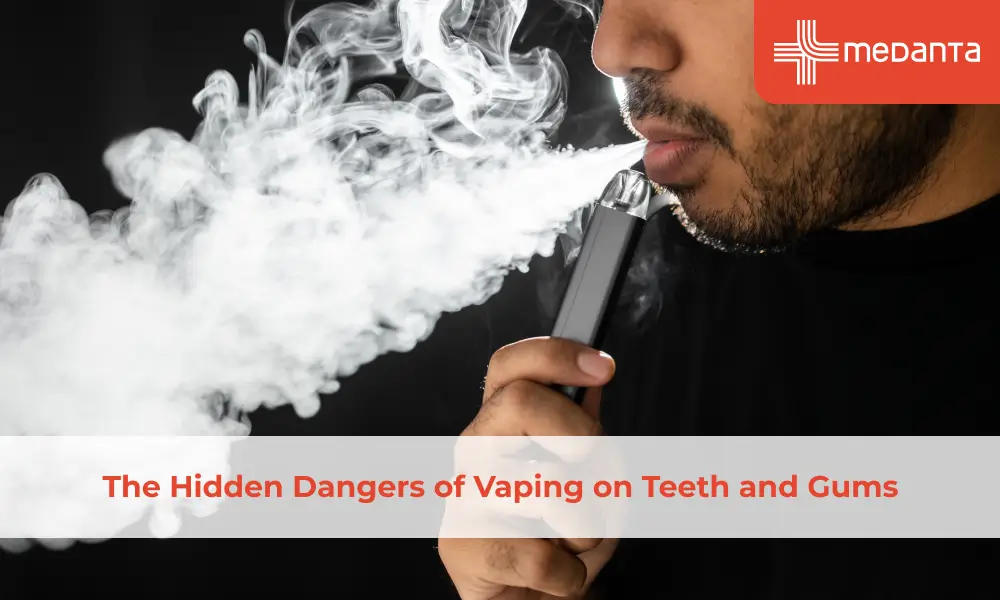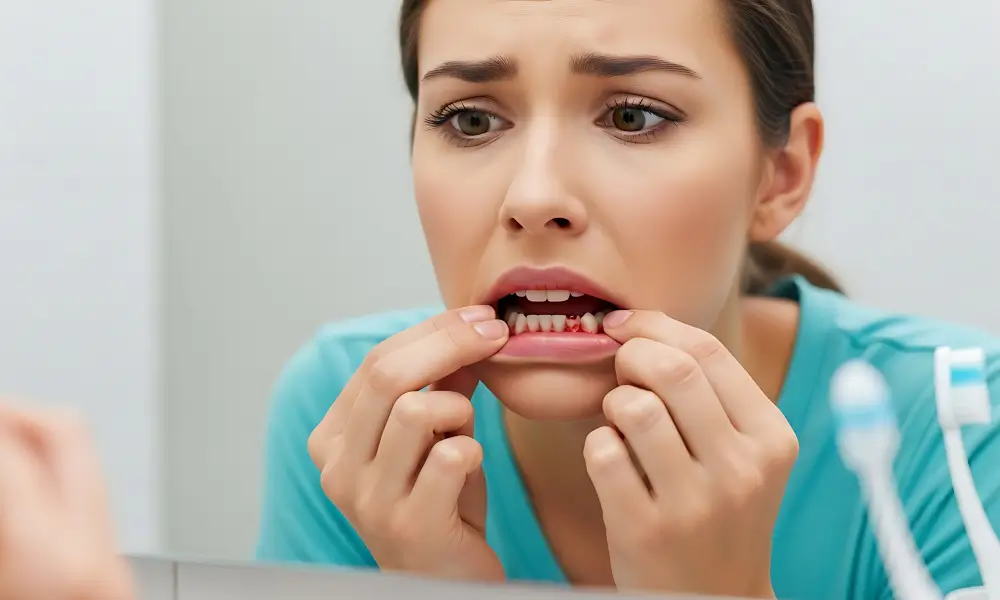The Hidden Dangers of Vaping on Teeth and Gums

TABLE OF CONTENTS
Youth e-cigarette usage has reached alarming levels with millions of young people using these devices. People often switch to vaping because they think it is safer than smoking, but vaping can seriously damage their teeth (a fact many users overlook). This article reveals the hidden risks of vaping and shows you how to protect your oral health if you vape.
The Affect of Vaping on Gums
Vaping can wreak havoc on your oral health. E-cigarette vapour's chemicals irritate gum tissue and cause inflammation, redness, and swelling. Your risk of gingivitis and periodontal disease goes up when you vape, which can lead to receding gums and lost teeth. The direct effect on teeth is clear - sweet and acidic vape liquid flavours eat away at tooth enamel, making teeth more cavity-prone and sensitive.
Vaping creates several other oral health issues. Users experience dry mouth (xerostomia) and reduced blood flow to their gums. The practice disrupts the mouth bacteria balance and creates perfect conditions for harmful bacteria. Your mouth faces a harsh environment from the mix of nicotine, propylene glycol, and chemical flavourings. Research shows that vapers' gum disease markers match those of traditional smokers.
Impact of Vaping
Vaping changes the bacterial environment in your mouth by a lot. It creates perfect conditions that allow harmful bacteria to thrive. Research shows these devices disrupt the oral microbiome. They help cavity-causing bacteria like Streptococcus mutans grow while suppressing protective species such as Streptococcus sanguinis. This bacterial imbalance makes people more likely to develop periodontal disease and dental caries.
Sticky aerosol from vape liquids leaves a coating on the teeth's surfaces and traps stains in the enamel. Studies show e-cigarette liquids have low pH levels that erode enamel and make teeth sensitive. These liquids mix with sweetened flavourings to create a sticky residue on teeth that speeds up decay.
Vaping affects oral health in several ways:
Dry mouth complications - Many vapers report this problem that guides them toward oral discomfort. They find it hard to eat and face higher cavity risks because they produce less protective saliva
Mucosal irritation - People experience burning sensations, stinging and general oral discomfort
Compromised healing - Nicotine reduces blood flow to the gums. You can often see poor healing after dental procedures & implant failures.
Potential injury risk - Reports show vapes have exploded and caused facial damage and harm to oral tissues
E-cigarette manufacturers market themselves as a "safer" option than smoking. Yet they still put nanoparticles, volatile organic compounds, carbonyls, heavy metals, and nicotine into the body. Clinical studies show patients who vape feel more gum pain and oral symptoms than non-smokers. These symptoms are nowhere near as severe as those traditional smokers experience.
New research keeps finding troubling connections between vaping and serious oral health problems. Scientists have discovered potential DNA damage to oral epithelial cells that might lead to cancer development.

Vaping vs Smoking: Is One Better for Oral Health?
People often ask if switching from cigarettes to vapes helps their oral health. The research paints a nuanced picture, as shown in this comparison:
Oral Health Factor | Traditional Smoking | Vaping | Non-smokers |
|---|---|---|---|
Plaque Buildup | Highest levels | Elevated levels | Lowest levels |
Gum Inflammation | Most severe | Moderate impact | Minimal |
Bleeding on Probing | Reduced (masked by nicotine) | Reduced (masked by nicotine) | Present (healthy response) |
Inflammatory Markers | Highest levels | Elevated levels | Normal levels |
Tooth Decay Risk | High risk | Increased risk, especially with sweet flavours | Baseline risk |
Bacterial Environment | Substantially altered | Moderately altered, shows different patterns from smoking | Balanced oral microbiome |
Antioxidant Capacity | Substantially decreased | Comparable decrease to smoking | Normal protective capacity |
Gum Disease Risk | Highest risk | Elevated risk | Lowest risk |
Tooth Staining | Severe | Present but less severe | Minimal |
Both methods deliver nicotine that limits blood flow to the gums. This makes infections more likely and treatments don't work as well. Tobacco smokers' oral health remains worse than that of vapers in most measurements.
Recent studies have revealed something surprising (e-cigarettes might damage teeth more than regular cigarettes). The sticky nature of e-liquids combined with sweet flavours accelerates bacterial growth that causes cavities.
What Dentists Say About Vaping and Oral Health
Dentists have found alarming evidence. Vapers get more cavities than non-users. Their gums become more inflamed even with the same amount of plaque. Research shows an even bigger problem. Vapers develop bacterial imbalances (dysbiosis) in just six months. Regular smokers take five years to reach this level. This quick bacterial change creates perfect conditions for disease much faster than regular cigarettes.
Oral Care Tips for People Who Vape
Dental experts recommend these steps for vapers:
Schedule dental visits every 3-4 months instead of twice yearly
Drink plenty of water to fight dry mouth
Use both fluoride toothpaste and antibacterial mouthwash
Pick basic e-liquids without extra flavouring
Long-term Consequences: Gum Disease, Tooth Loss, and More
The long-term outlook raises serious concerns. E-cigarette vapour's chemicals trigger oxidative stress & inflammation which breaks down tissue & leads to mouth sores. Vape products have nicotine that can shrink your blood vessels. This cuts oxygen to gum tissues and slows healing after dental work. Your mouth becomes more prone to infections. This chain of events can lead to lost teeth, failed implants, and lasting gum disease.
Should You Quit Vaping for Your Oral Health?
Every dental expert agrees - quit vaping. The good news? Your oral health starts getting better almost right away. Your mouth produces normal amounts of saliva again. Gum inflammation goes down. Your mouth's natural healing powers come back. Given enough time, people who quit vaping can have the same oral health risks as those who never started.
Many people find it hard to quit. Dentists suggest using nicotine replacement therapy. They recommend tracking your progress and celebrating small wins. Don't hesitate to ask doctors for help. Your smile's health depends on the choice you make today.
Conclusion
Vaping might look like a safer option than smoking, but it can seriously damage your teeth and gums. Anyone who wants to try e-cigarettes needs to know about these hidden dangers. Many people switch to vaping to dodge health problems, but research shows E-cigarettes might actually hurt your teeth more because their sticky, sweet e-liquids feed bacteria that cause cavities.
Dentists of all types agree that vaping ruins your smile. Here's the silver lining - quitting helps right away. Your blood flow gets better, saliva production returns to normal, and your mouth starts to heal. Former vapers can get their oral health back to the same level as people who never touched e-cigarettes. Dental professionals can help protect your smile through extra preventive care or support to quit. Your oral health is not just a beautiful smile; it is a reflection of your overall health.
FAQs
Does vaping affect your teeth and gums?
Vaping damages your teeth and gums. E-cigarette vapour's chemicals trigger gum inflammation, redness, and swelling. These harmful ingredients destroy your teeth's supporting tissues and can reach a point of no return. Your gums receive less blood flow and tissue death can occur even without tobacco.
Can vaping cause gum disease or infections?
Research links vaping to higher gingivitis and periodontal disease risks. The chemicals upset gum tissue and create ideal conditions for harmful bacteria. Vapers show bacterial changes in six months that take smokers five years to develop. Your immune system weakens from vaping, which makes fighting oral infections harder.
Why does vaping lead to dry mouth?
E-cigarette users often deal with xerostomia (dry mouth). This occurs because:
Saliva producing cells become less responsive after repeated vaping triggers
Propylene glycol in E-liquids reduces the moisture
of the mouth tissues
Bacteria and food particles stay in your mouth longer without enough saliva which raises your cavity risk.
Is vaping safer for oral health than smoking?
The European Federation of Periodontology cautions that vaping can harm your gums and oral health just like traditional cigarettes. Users face fewer oral issues than smokers but experience more problems than non-smokers.
What are the signs of vaping-related dental problems?
Look out for symptoms (including but not limited to):
Swollen, bleeding gums
Persistent bad breath
Increased tooth sensitivity
Dry mouth and tongue inflammation
Cracked lips
Changes in taste
Can vaping cause tooth decay or enamel erosion?
E-liquids contain low pH substances that wear down enamel & increase tooth sensitivity. Sweet flavours help cavity causing bacteria like Streptococcus mutans grow. Research shows strong connections between vaping & untreated cavities.
How does nicotine in vapes affect oral health?
Nicotine cuts blood flow to your gums & slows healing after dental work. This makes treating existing oral conditions harder and increases your risk of dental implant failure.
Are there vape products that are safe for teeth?
The truth is that no vape products will keep your oral health safe. Even vape liquids without nicotine can damage oral tissues because chemicals and acidic vapours harm the mouth tissues.
How can vapers protect their teeth and gums?
People who keep vaping can take these steps to lower their risks:
Hydrate aggressively - Your body needs plenty of water throughout the day to combat dry mouth
Switch to high-fluoride toothpaste and try alcohol-free fluoride mouthwash
See your dentist every 3-4 months rather than just twice a year
Rinse your mouth with water or alcohol-free mouthwash after vaping to balance pH levels
Pick lower nicotine options where possible to reduce negative effects
Try saltwater rinses or herbal mouthwashes to cut down bacteria
Should I tell my dentist if I vape?
You absolutely should! Your dentist can provide better care when you're honest about vaping. They need this information in your medical record and can watch for specific changes like oral mucosal lesions. They will screen for oral cancer and check for vaping-related conditions that you might miss.






